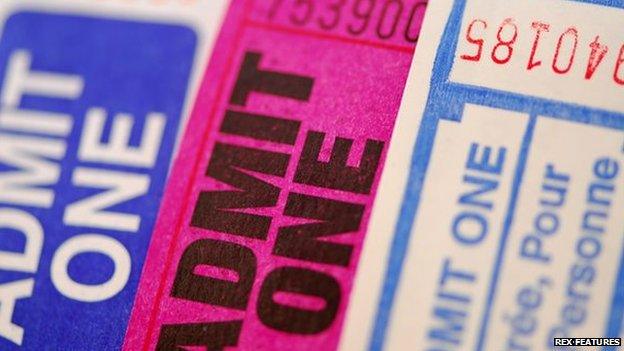'British films should be cheaper at cinemas': Lionsgate UK
- Published

The price of a UK cinema ticket has increased 18% in the past five years
Cinemas should offer a greater variety of ticket prices, according to one of the leading figures in the UK film industry.
Zygi Kamasa, head of Lionsgate UK, whose films include The Hunger Games and Postman Pat, said prices at the box office should reflect film budgets.
An independent British film should cost £4 and a Hollywood blockbuster £10, Kamasa suggested.
"Something drastic" was needed to reverse falling admissions, he added.
"In most other industries, retail price is related to the cost of production, but not in the film business," Kamasa told Screen Daily, external.
"A blockbuster can cost $250m and a UK independent film can cost $4m but it's £10 or more to see both.
"I think we should see UK films priced at £4 and US films at £10. A trip to the cinema isn't cheap anymore," he added.

Blockbusters such as Interstellar should attract higher ticket prices, claims Zygi Kamasa
Monthly cinema admissions are already down 10% so far this year compared to 2013, according to figures from the British Film Institute.
While exhibitors have predicted a bounce back next year with blockbusters including Star Wars: The Force Awakens, The Hunger Games: Mockingjay Part 2 and Avengers: Age of Ultron, Kamasa warned that a run of "tent-pole" releases could also damage local diversity.
"The problem is you'll likely have 20 films that take $40m (£25m) each and not much beside," he warned. "They will account for more than 95% of the business and it could lead to an unhealthy lack of cultural diversity.
"I think UK film needs a bigger support from UK distributors and exhibitors and this could be one way to do that."

Lionsgate UK helped promote Postman Pat: The Movie, starring Rupert Grint
However, the Cinema Exhibitors' Association said a pricing mandate would act against diversity.
"Cinemas are essentially businesses," said the association's chief executive, Phil Clapp. "They look to maximise revenue however they can.
"If you introduce pricing according to budget, cinemas are naturally going to show the blockbusters to get a higher revenue.
"I think we need to be careful of ghettoising particular films," he told the BBC.
Price structure
The average cost of a cinema ticket in the UK is currently £6.54 - an increase of 18.5% in the last five years.
The figure is calculated by dividing box office profits by the number of tickets sold, so it includes special deals like buy-one-get-one-free and daytime discounts.
The profit from a cinema ticket, once VAT is deducted, is split between the cinema chain and the distributor. The cinema chain sets the price of the ticket and the cost varies depending on several factors - from screen and seat size to the cost of renting the venue.

What We Did On Our Holiday, starring David Tennant, cost £3m and made a similar amount at the UK box office
Speaking to the BBC, Mark Batey from the Film Distributors' Association, said that getting films on the cinema screens was already a "complex jigsaw puzzle", with so many titles competing for space.
"In 2013 there were 700 feature films released alone. For most films, a cinema run will only last a few weeks, as there are so many newer titles constantly being released.
"The budget of the film is not necessarily an indication of its popularity - take The King's Speech or The Artist, for example.
"The question of 'what to do' to boost admissions does need addressing," he added, "but there is no easy answer and it needs careful thought".
Lionsgate UK has released eight British films this year - including Locke, The Invisible Woman, Postman Pat and the low budget comedy What We Did On Our Holiday.
The company, which recently relocated its sales headquarters from California to the UK, said British films continued to be one of the industry's "big growth areas".
- Published18 November 2014

- Published17 February 2014
- Published23 January 2014

- Published31 January 2014

- Published7 November 2014
